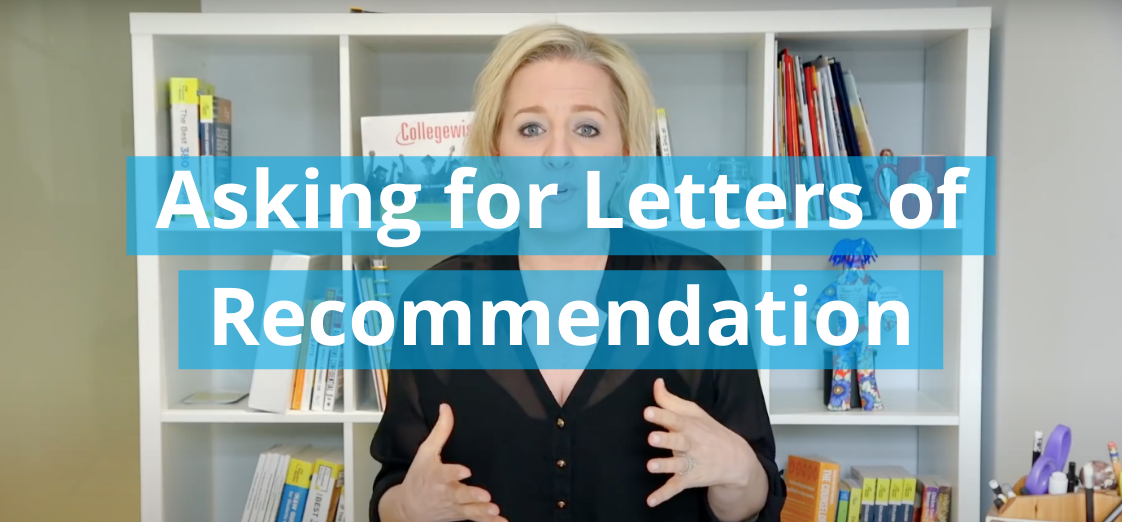Which teachers to ask for letters of recommendation is one of the biggest questions facing any college applicant. But why is it so important? How do colleges use letters of recommendation? And how should a student decide whom to ask? In this post, we’ll shed light on those answers.
I’m someone who loves control. I’ll spend hours decorating a room exactly right; I’ll rewrite a sentence a million times until it flows perfectly; I organize the books on my bookshelf not just by subject but also by time period. As a Collegewise counselor who has assisted more than a hundred successful college applicants, I think that’s why I enjoy reviewing applications with my students; all the information is there, precisely organized, and presented in just the way we wanted it.
Except for the letters of recommendation.
You may not be familiar with the recommendation process. It certainly gets less press than other pieces of college applications, like transcripts, essays, or extracurriculars. But at many colleges, it’s an important element — and it’s one that doesn’t fit cleanly within that perfectly-organized application I love. Ready to learn about this strange creature? Let’s go!
Table of Contents:
- What are Letters of Recommendation & Why Do Colleges Want Them?
- A General Timeline for Letters of Recommendation
- How to Find the Right Recommender
- How to Ask
- Final Thoughts
What are Letters of Recommendation & Why Do Colleges Want Them?
College applications are often thorough and well-built, but there is no form on earth that could possibly capture the unique circumstances, interests, and challenges of every student. So, many colleges (more than 350 US colleges, in fact) require teachers and school counselors to provide additional information beyond what’s available in the application.
Most often, recommendations include both a quantitative and a qualitative measure. For instance, a recommendation submitted through the Common App will have a space for recommenders to mark students on a scale that ranges on various points from “below average” to “one of the top few I have encountered in my career.” The qualitative portion will ask educators to submit a written recommendation where they can explain how, exactly, they believe their student stands out from their peers. There can be a lot of power in those explanations, and there are important reasons many colleges ask for them.
- Students often leave important information out of their application, especially if they think it’s embarrassing or doesn’t seem appropriate for a college application. But those explanations can often provide admission officers the context they need to understand the rest of the application. For instance, a student might go from straight As in 9th and 10th grade to Cs in 11th, and without context, that trend would raise some real worries in an admission office. But if their counselor explains that that student’s parents were going through a messy divorce during that time and that her schoolwork is already back to her usual excellence in 12th grade, all of a sudden the, Cs begin to be less worrying.
- Many colleges value something hard to see in a transcript: intellectual curiosity. It’s one thing to take many challenging classes because you know selective colleges expect it; it’s an entirely different thing to contribute to the intellectual climate of those classes. Teachers can use their recommendations to point out a student without whom their class just wouldn’t be the same — the student who asks questions, raises great points, and goes above and beyond in their class reading. If you’ve ever asked a question that made a teacher stop and think; been the driving force behind a classroom debate; or helped someone struggling on a project, then you’ll know what that might look like.
But here’s my favorite answer when my students ask why colleges care about these recommendations: the people reading your application just want to know that their professors are going to enjoy having you in their classes. Admission offices often work closely with faculty, to make sure that they’re attracting and accepting the types of students who will mesh with professors. Students who are kind, questioning, curious, and thoughtful make any classroom brighter; students who are passive, selfish, or grade grubbers usually don’t.
A General Timeline for Letters of Recommendation
I usually bring up recommendations with my students early in the spring of their junior year. At that point, they’ve had their 11th-grade teachers for a few months, and they’ve figured out which classes they’ve thrived in and which teachers they’ve really clicked with. At that point, we can have an intelligent conversation about which two or three teachers would be most appropriate to ask to provide letters of recommendation. Their next assignment: to continue impressing those teachers for the rest of the semester with their kindness and their thoughtful participation in class.
Depending on their high school’s policies, my students will actually ask those teachers a couple of weeks before summer or just after school resumes in 12th grade. Ideally, I think, earlier is better — when I was teaching, I would have appreciated knowing in advance so I could use the summer to write. Some high schools have specific periods in which to request recommendations, and that’s just fine, too; it’s not a race! Just make sure you give your teachers enough time to write an effective recommendation (meaning several weeks, at minimum).
How to Find the Right Recommender
- In which class do you participate the most?
- Which teacher knows you the best, including the things you do outside of class? Have you had real conversations, outside of a classroom discussion, with any of these teachers?
- Can any of your teachers tell a positive story about you? Which teacher has seen you be kind to others?
Those are some of the questions I ask my students when we’re discussing which teachers they might ask for a recommendation (I also send them this post by my colleague Cecilia). Invariably, there are two or three classes in which their teachers have seen them at their best, and those are usually the ones my students focus on.
Beyond that general advice, there are also some specific guidelines you should try to follow:
- Try to ask teachers from core subject areas (math, science, English, social science, and languages other than English). Because they’re core classes with a standardized academic curriculum, your admission officer will be able to contextualize your achievement and consider your potential as a college student more easily.
- Try to ask junior-year teachers. You’ll be applying to college during the fall and early winter of 12th grade. At that point, your 12th-grade teachers will have only known you for a couple of months; that’s usually not enough to have an in-depth picture of who you are. At the same time, your 10th-grade teachers will have gone nearly two years without you in their classroom; the things they can write about may not reflect who you are as that’s way too long for an accurate letter for a senior. So, stick to your 11th-grade teachers in most circumstances.
- Make sure to align your recommenders with the expectations of the colleges you’re applying to. For instance, MIT requires two letters of recommendation: one from a STEM teacher, and one from a humanities, social science, or language teacher. There’s no wiggle room there, and a student who requests recommendations from a history and an English teacher is not following the instructions.
- Don’t worry too much about your teachers’ writing ability. It’s the content, not the style, that’s important.
How to Ask a Teacher
When you’re ready to request a letter of recommendation from a teacher, a personal touch goes a long way.
Start by finding a quiet time to chat one on one. The end of the day, after a teacher’s last class, is often a good time. Alternatively, use your teacher’s office hours or schedule a few minutes to talk. Try not to initiate this conversation over email.
In that face-to-face conversation, be straightforward and honest. I often ask my students to include three elements:
- First, the reason why they’re asking this teacher (your love for the class and the subject; a particular project that sparked your curiosity and showcased excellence; your after-class chats about life).
- Second, explain the teacher’s unique ability to write a strong letter (“I think you’ve seen me at my best;” “I think you’ll be able to describe how I help other students in class”).
- Finally, the ask: “Would you consider writing me a strong letter of recommendation for my college applications?” By asking thoughtfully, you’ve given your teacher the warm fuzzy feeling of making a difference in your life; you’ve explained why they’re suited to the role of recommender; and you’ve given a subtle hint about what you’re really proud of — something that might support the rest of your application.
For more insight on how to ask for letters of recommendation, check out our YouTube video below!
Final Thoughts
Recommendations are a privilege to write. It’s an educator’s chance to advocate for their student and to reflect on their future growth. In some ways, it’s validation for a career in education.
But writing a good letter of recommendation is hard. In fact, it’s a giant pain. And, what’s more, it’s not your teacher’s actual job to write them. So make sure to do your part, too: if your counselor or your teachers want a brag sheet, a resume, or a questionnaire from you, don’t argue; do it. Ask them far in advance, and beyond sending them the supporting information they asked for materials they’d like (and a quick thank-you), don’t bother them for a while.
The reward for your patience will be an authentic, glowing letter that helps colleges understand your unique capabilities and potential for growth. It’s well worth the trade.
About Us: With more than twenty years of experience, Collegewise counselors and tutors are at the forefront of the ever-evolving admissions landscape. Our work has always centered on you: the student. And just like we’ve always done, we look for ways for you to be your best self - whether it’s in the classroom, in your applications or in the right-fit college environment. Our range of tools include counseling, test prep, academic tutoring, and essay management, all with the support of our proprietary platform, leading to a 4x higher than average admissions rates.



.png?width=600&height=200&name=Blog%20CTAs%20(7).png)



